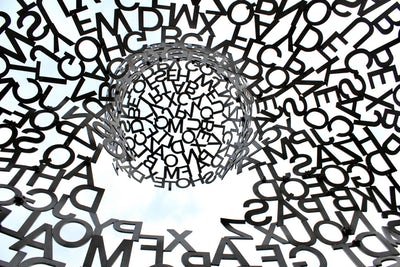The "Psychedelic" Rewards of Learning a New Language

Despite having parents who both spoke a second language, I never learned to speak anything besides English as a kid. It wasn't until I was an adult with a history of psychedelic usage that I started to study a second language. I took a year of "Accelerated Latin" in college, which is, supposedly, the equivalent of taking two years of regular Latin. I can't say if that is actually true but I did very well in the classes and picked up the language at a fairly rapid pace. In addition to the obvious benefits of learning another language (there are fewer of those if you choose to learn a dead language, like I did, but there are still many), I noticed some cognitive changes that seemed to be born out my new linguistic understanding that were unexpected and highly reminiscent of my psychedelic experiences and the new modes of thinking that they enabled. Like using psychedelics, learning a second language seemed to create an alternative framework upon which to build ideas, it allowed for novel modes of interpretation, and increased my potential for creative thought. Perhaps, I am seeing things that aren't really there but the psychedelic-like benefits of learning a secondary language seem real enough to me and I thought it might be fun to explore the idea in a little bit of depth here.

I have written about the shift in consciousness that is associated with the use of psychedelic drugs quite extensively in the past and, that being the case, I don't want to go into great detail about that subject at this time but I will give a brief explanation of what I am talking about when I refer to the psychedelic benefits of learning a second language. Psychedelic substances cause an extreme change in perception and that has a powerful effect on the way that we interpret incoming sensory data which adds new novelty to the thoughts that it generates. This phenomenon is demonstrated well by things like the visual hallucinations that one may experience after taking one of these drugs. The data is the same. The room, for example, looks like it always did but, to a user, it appears to have changed. The same is true of more complex thought. Because psychedelic drugs provide an alternate pathway for interpretation and understanding, a user developers a secondary approach to thinking about the world. I could go into much more detail but that should suffice for our purposes because I believe that those same sorts of psychedelic changes also occur when one begins to learn a new language (though to a lesser degree).
The connection between psychedelics, language, and their similar effects may seem a little loose but there are some good reasons to view using psychedelic drugs and language learning as related activities. The "Stoned Ape" theory credits the development of language to the use of psychedelic mushrooms by our very early ancestors (that is a gross oversimplification, of course, but it should function fine). I am no expert on that particular theory but its existence is worth noting given the subject here. Psychedelics and language have some of the same results too. That is to say that they both cause the user or the listener to take in sensory data and attach abstract meaning or "images" to it. Words are often represented as "images" in our minds. If I say "dog," the listener will picture a dog in his or her mind. Simply put, the sound of the word and the meaning attached to it "generates a mental image of a dog. The visual hallucinations that are conjured by psychedelics are also the result of our interpretation of sensory data and the attachment of meaning which generates a more literal sort of mental image. In that sense, it is fair to say that psychedelics allow us to respond to the world and the things that we observe as though it is a form of language. With all of that being considered, it should not seem like a particularly long stretch of the imagination to say that learning a new language may have some of the same benefits as using psychedelic drugs.

I began to notice that I was developing an alternative framework, upon which to base my thinking, as I grew comfortable with Latin sentence structure. In English, the default word order is usually as follows: First, comes the subject, the verb, and, finally, the object. In Latin, a sentence typically uses a "subject object verb" structure. Becoming used to that difference (or similar differences between other languages) forces one to alter his or her order of thought. That is a small shift but thinking about things in a different order can change the conclusions that a person comes to when he or she examines an idea or a problem. Learning the new language only requires this change for understanding or translating the foreign grammar but our minds have a habit of applying new abilities in unexpected ways and that allows this specific linguistic skill to be taken advantage of for other purposes. This change in the order of one's cognition is quite like the changes in thinking that occur during a psychedelic experience. That sort of drug has a tendency to jumble a users thought patterns. They still make sense to the user but they come in an unexpected order. When the user returns to reality, the memory of the alternative order of thought remains and it allows the user to call upon that new order of thought in situations that may benefit from it.

There are further similarities between the changes that take place in a psychonaut and in a student of a new language and they both seem to stem from a shift in the way that one interprets meaning. The amount of information that a word can carry differs from one language to another. In Latin, a single word can say what would require two or three words in English. A six word statement like "I am going to the field" can be expressed with three words in Latin: "Ad agrum eo." The subject (I, in this case) is stated within the verb (eo "I go" or "I am going") and there is no need for an indefinite or definite article ("a" or "the") because it is implied by the context of the statement (I wouldn't go to "a" random field so I must be going to "the" field). Becoming accustomed to those kinds of differences between languages requires one to change the way in which he or she attaches meaning to words. In some languages quite a lot of information can be expressed in a single word and in others it cannot. The direction that one moves in when he or she learns a language should not matter because either change (saying less or saying more with a word than one is used to saying) still requires the same alteration of understanding. When this shift in interpretation is applied to thoughts that do not relate translation, our new duel modes of understanding give us the ability us to reexamine ideas and beliefs with "fresh eyes" which can profoundly change the way that we view them. Again, this effect of learning a language has a certain quality that is strikingly similar to the changes in thought that occur during a psychedelic trip. The chemically caused shift in consciousness often leads to a user attaching meaning to things that may have seemed meaningless to an unaltered individual or, conversely, it can allow the user to see the absurdity of the useless meaning that we attach to certain concepts. It would seem that both paths (that of the student and that of the psychonaut) lead to the same destination.
While the changes that occur in the users of psychedelics and students of new languages are interesting on their own, they begin to take on a great deal of value when we think about the rewards that we can gain by taking advantage of them. Whether one learns how to alter the order in which he or she thinks about problems through the use of psychedelics or by learning another language, he or she has developed an alternative way to approach those problems. One who learns how to add or subtract meaning from concepts can more thoroughly understand them and their true significance. If one learns new and novel ways of generating ideas, his or her potential for creativity increases, regardless of whether he or she chose a chemical or educational path to expanding his or her consciousness. The psychedelic-like benefits that one receives from learning a second language are not as immediate or profound as they can often be for one who takes the drugs themselves but they are not insignificant. That should make the act of language learning attractive for one who is looking to simulate or enhance the rewards of being a psychonaut.

As I said before, I could be seeing things that aren't there (which is not out of character for a psychonaut, such as my self) but it is hard for me to ignore the similarities that I have observed between the use of this class of drugs and learning a new language. There is a question that I am left with and I hope to touch upon it in an upcoming post: Which direction does the psychedelic connection to language flow? That is to say, I wonder if language, itself, is psychedelic by its nature or if psychedelics enhance our preexisting, yet untapped, potential for linguistic understanding. Does language owe its existence to our ability to slip into naturally occurring psychedelic states of mind or do psychedelics teach us to "speak" the ambient language of the universe? I don't have an answer to that question, at this point, but I suppose that it does not matter when we are talking about results. There are similar benefits to expanding consciousness through linguistic education and the use of psychedelic substances. If one has the opportunity to learn or trip, it is probably wise for that person to take advantage of it.
Peace.
All the images in this post are sourced from the free image website, unsplash.com.
This post has been upvoted by @minibot with 25.0%!
Thank you for giving your trust and witness vote to my creator @isnochys!
More profits? 100% Payout! Delegate some SteemPower to @minibot: 1 SP, 5 SP, 10 SP, custom amount
My native tongue is English and is slowly becoming fluent in German. I definitely think differently in each language. I am starting to think in German a lot more as I think it's more practical but I like speaking English better it seems better for communication. I have a history with psychedelic drugs as well I can sort of relate but that was over 15 years ago so I don't really know anymore
I took French in school up to grade 9, I can now understand it but I'm not very good at speaking it. That's the only other language I know other than English.
Resteemed by @resteembot! Good Luck!
Check @resteembot's introduction post or the other great posts I already resteemed.
Hello @artisticscreech, thank you for sharing this creative work! We just stopped by to say that you've been upvoted by the @creativecrypto magazine. The Creative Crypto is all about art on the blockchain and learning from creatives like you. Looking forward to crossing paths again soon. Steem on!